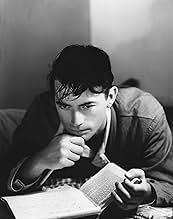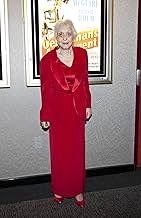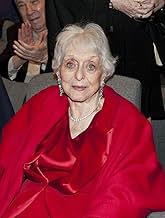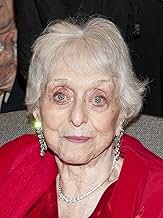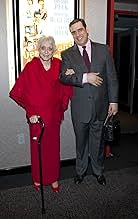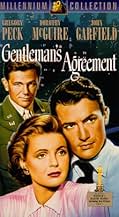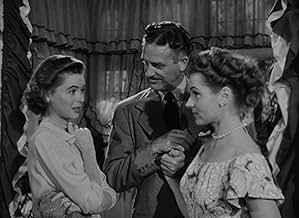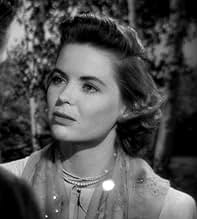Un journaliste se fait passer pour un juif afin de couvrir un article sur l'antisémitisme. C'est ainsi qu'il découvre réellement les véritables profondeurs du sectarisme et de la haine.Un journaliste se fait passer pour un juif afin de couvrir un article sur l'antisémitisme. C'est ainsi qu'il découvre réellement les véritables profondeurs du sectarisme et de la haine.Un journaliste se fait passer pour un juif afin de couvrir un article sur l'antisémitisme. C'est ainsi qu'il découvre réellement les véritables profondeurs du sectarisme et de la haine.
- Réalisation
- Scénario
- Casting principal
- Récompensé par 3 Oscars
- 17 victoires et 9 nominations au total
- Bill Payson
- (as Ransom M. Sherman)
- Waiter
- (non crédité)
- Nightclub Patron
- (non crédité)
- Mother
- (non crédité)
Avis à la une
I recommend this film, but it won't be for everyone and many of us would rather just pass this one by. But we shouldn't even though it holds up this mirror making us feel guilty and uncomfortable. I should point out that the ending relating to the love interest in the story just doesn't work, but then that is not the purpose of the film. Prejudice, anti-Semitism and discrimination are, and these elements are worked out well. A disturbing but intelligent portrayal which is worth taking in for what it is worth.
However, this movie has lessons that every new generation should learn.
The lessons taught in this movie can be applied to other forms of prejudices such as sexism, racism, and homophobia among others.
Our society today is still full of "nice" people who detest bigotry and intolerance, but stand idly by while it happens right in from of them. Watching this movie could change all that.
A "gentleman's agreement" is a euphemism for a polite, unspoken act of racial bigotry. Yes, a sort of wink to not allow blacks or hispanics or Jews into a certain resort or club or restaurant.
That's the real point of the movie. Not hard core racism or prejudice, but that subtle stuff, the stuff that goes on every day even now. And ultimately, it is aimed at the people who say, "I'm not prejudiced," and yet who let other people wink and act like polite bigots.
There is a lot of background to the movie, in the making and acceptance of it in the industry and in the country (in short, Hollywood insiders avoided the idea and the public liked it). But the main point is how the movie works and plays out as a story, then (in our heads) and now (on the screen).
The answer? Very well. Yes, it's "preachy" of course. Of course! That's what a message movie does. But does it do it well? Yes, but it does mean there is a lot of talking. The key talker and thinker is main character, goy journalist Phil Green, played by Gregory Peck. He struggles out loud through how to approach an article he has to do on anti-Semitism with his mom, and then struggles through the actual highly veiled anti-Semitism of his potential wife, played by Dorothy McGuire. We know they are made for each other, but McGuire's character just can't quite get how her "looking the other way" or "feeling outrage" isn't enough.
The real acting gem is by Celeste Holm, who plays a sidekick, another writer, and someone who audiences probably want to see with Mr. Green because she has innate principles and the guts to show them. (She won an Oscar, too!) John Garfield, who was Jewish, plays an openly Jewish character in a deliberately restrained role as a returning G.I. It's 1947, and the country that has helped to save the remaining Jews in concentration camps is now wondering how to "save" them at home from internal barriers.
It might have been a mistake to set the movie in New York City, which was over a quarter Jewish at the time and probably had more familiarity with assimilation and difference than the movie implies (especially at the publisher's). But the scenes in stuff Connecticut make more sense. There is the love plot pushed on the whole thing, and the weirdly perfect house that was built and decorated but never lived in as if that's the future, waiting and ready. And yes, there is all the talking and moralizing.
But give director Elia Kazan credit for making this as fluid and involving as he has, and cinematographer Arthur Miller's beautiful post-War visuals hold up that end of the experience really well. And you know what, the "lessons" built into this kind of "message" film are worth sitting through because we all need reminders of how insidious our own prejudices can be, and how we need to constantly address them, openly.
Anyway now to the plot. Phillip Green (Gregory Peck) is a writer who pretends to be Jewish to find out about anti-Semitism. Through this, he learns how much people discriminate against Jews and it affects him deeply and changes his life.
I was never bored in this film. I am forever fascinated by Peck, who I've always remembered as Atticus Finch in To Kill a Mockingbird (1962). This is only the second film I've seen with Peck in his younger days (it's quite a pleasure watching him). Celeste Holm also is amazing and I love how she can laugh so easily very realistic. The only thing I wasn't satisfied with is the romantic choices by Peck's character. I wish he would have chosen the happy blonde Anne instead of the sappy, boring Kathy. Oh, how I was hoping he would choose Anne! Perhaps Dorothy McGuire was miscast; maybe someone else could have brought more energy to her character. John Garfield is fantastic as Green's Jewish friend.
This was ground breaking at the time and I really respect the people who participated in this film for taking a risk. Despite being made almost 60 years ago, I have not only learned from it but enjoyed it. Yes, there are some inaccuracies and plot holes, but I don't particularly care and it doesn't distract me. It's a great film, go see it.
During the course of the film names like Gerald L.K. Smith, Theodore G. Bilbo, and John E. Rankin are mentioned. The first was a Protestant evangelical minister who started out with Huey Long, but then developed a line of anti-Semitism in his sermons. He had a considerably large following back in the day though the Holocaust did a lot in killing his recruiting. Theodore G. Bilbo and John E. Rankin were a couple of Mississippi politicians who for their redneck constituency successfully linked anti-Semitism and racism. They didn't like foreign born either and used a whole lot of ethnic slurs.
But the anti-Semitism that Gregory Peck takes on is not that of Bilbo, Smith, and Rankin. It's the genteel country club anti-Semitism that manifests itself in restricted resorts, quotas as to how many Jews will some white shoe law firm accept if any, discrimination in hiring practices, unspoken covenants {gentlemen's agreements} not to sell to Jews in certain areas; all these we see in Gentlemen's Agreement.
Peck is given an assignment to write about it and he hits on a novel approach. Just being hired by publisher Albert Dekker, he gets Dekker's backing when he says he will pretend he's Jewish and see how he's being treated. He gets quite an experience in the bargain.
Running parallel to Peck's masquerade is his courtship of Dorothy McGuire. She's a divorcée, he's a widower with a young son. The whole thing puts a strain on their relationship, especially in dealing with her sister, Jane Wyatt who lives in one of those restricted by Gentlemen's Agreement communities.
Gentlemen's Agreement came up with several nominations and three Oscars for Best Picture, Best Director to Elia Kazan, and Best Supporting Actress to Celeste Holm as a tart tongued fashion writer at Peck's magazine who proves to be a friend. Peck himself was nominated for Best Actor, but lost to Ronald Colman for A Double Life. Holm also beat out Anne Revere nominated for the same film, probably helped by the fact that Revere had won a few years earlier for National Velvet.
John Garfield who was Jewish took a small supporting role in the film as Peck's long time childhood friend who educates Peck into how a Jew deals with the rebuffs he's finding out about. Had he not been up also for Body and Soul as Best Actor, he might well have earned a Supporting Actor nomination here.
Also note Sam Jaffe as the fictional professor Lieberman which is a thinly veiled caricature of Albert Einstein probably the most noted figure in the world of Jewish background. Like Lieberman, Einstein's a cultural Jew, not religious in any sense of the word. Nevertheless he was a leading figure at the time in the Zionist movement, having endured all that Peck endured in Germany and seeing what was coming with Hitler, fled his native Germany for safe harbor in the USA.
My favorite character in the film however has always been June Havoc as Peck's secretary. She changed her name to something ethnically neutral to get her job in the very magazine that will now crusade against anti-Semitism. She's also become a self hater, a phenomenon that other discriminated people also experience. GLBT activists are fully aware of what self hate has done, not hardly unknown among other groups as Ms. Havoc demonstrates.
Of course Gentlemen's Agreement is dated with its topical references to post World War II trends and events. Yet it still has a powerful message to deliver. It made Gregory Peck one of the great liberal icons of Hollywood and still should be seen by all as a great lesson in the pitfalls of unreasoning hate.
Oscars Best Picture Winners, Ranked
Oscars Best Picture Winners, Ranked
Le saviez-vous
- AnecdotesIn 1984 Gregory Peck claimed to have been misquoted in a 1967 interview in which he said Elia Kazan was the wrong director for the film. The actor said, "That's a misunderstanding. I don't think there could have been a better director for the film. What I meant was that he and I didn't have a rapport; emotionally, we were not on the same wave length. I don't think that I did my best work for him. If I worked with him now--as a mature man--I think I would give him everything he would want."
- GaffesEarly on, when Phil reminisces about his Jewish friend, Dave, he looks into the mirror and assesses his own features as being consistent with those of the Jews. This reveals his own experiences of having been influenced by the false stereotype of there being a "Jewish look". This is antithetical to his attacking anti-Semitic thoughts and actions in others, throughout the film. This, however, should not be considered a "GOOF" as many people are guilty of hypocrisy.
- Citations
Mrs. Green: You know something, Phil? I suddenly want to live to be very old. Very. I want to be around to see what happens. The world is stirring in very strange ways. Maybe this is the century for it. Maybe that's why it's so troubled. Other centuries had their driving forces. What will ours have been when men look back? Maybe it won't be the American century after all... or the Russian century or the atomic century. Wouldn't it be wonderful... if it turned out to be everybody's century... when people all over the world - free people - found a way to live together? I'd like to be around to see some of that... even the beginning. I may stick around for quite a while.
- Crédits fousThe main title theme begins with the Fox logo, replacing the usual Alfred Newman fanfare.
- ConnexionsFeatured in Precious Images (1986)
Meilleurs choix
- How long is Gentleman's Agreement?Alimenté par Alexa
Détails
Box-office
- Budget
- 1 985 000 $US (estimé)
- Durée1 heure 58 minutes
- Couleur
- Rapport de forme
- 1.37 : 1
Contribuer à cette page



